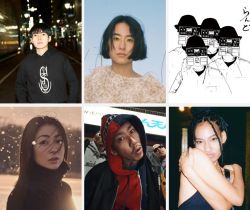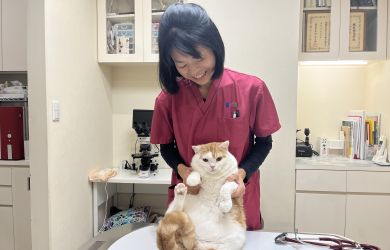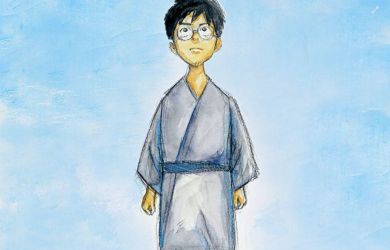
Originally published on metropolis.co.jp on December 2013
BREAKTHROUGHS

During the past year, Japanese scientists…
- …found that mice can tell the difference between paintings by Wassily Kandinsky and Piet Mondrian.
- …discovered that warm temperatures sweeten the taste of apples.
- …were able to “read dreams” by measuring brain activity during sleep.
- …collabrated on a method of removing debris and salt from farmland ravaged by the March 11 tsunami.
- …announced that the Sea of Japan coast tends to get hit by a major tsunami about once every 1,000 years… and that it’s been about 1,000 years since the last one.
- …developed a bicycle that can filter water while it’s being pedaled.
- …succeeded in using gene therapy to restore the memory of mice suffering from Alzheimer’s disease.
- …discovered that drinking four or more cups of green tea a day reduces the risk of strokes by 20 percent.
- …and found a chemical in the urine of male mice that attracts females.
HEADLINES OF THE YEAR
Stories you may have overlooked
- “20 Percent of ‘Worker’ Ants Don’t Work: Study” (Mainichi Japan, Jan 6)
- “Tokyo Gov’t Employees Confused over Governor’s Demands to use Twitter” (Mainichi Japan, Jan 30)
- “Man Held over Misuse of Interns” (The Yomiuri Shimbun, Feb 22)
- “Businessman Suspected of Slashing up to 1,000 Tires in Effort to Meet Women” (Japan Today, Apr 22)
- “Remains of Dog Given to Relatives After House Fire Turn Out to be Human” (Mainichi Japan, June 6)
- “Monk Matchmaking Event Proves Hit with Ladies Looking for that Enlightened Someone” (Mainichi Japan, June 9)
- “Android Teaches Japanese in Vietnam” (The Japan News, Sep 4)
- “Popular ‘Ugly but Cute’ Dog Regains Health and Fur” (The Asahi Shimbun, Oct 2)
- “Radiation Exposure Study Finds No Abnormality in Fukushima Bull Testis” (Mainichi Japan, Oct 9)
PASSINGS
Those we lost this year
- Michiko Yamaoka, who was 800 meters away from ground zero during the atomic bombing of Hiroshima and later underwent reconstructive facial surgery in the US , died of pneumonia in February. She was 82.
- John J. Wilpers Jr., a US Army intelligence officer who in 1945 helped capture wartime PM Hideki Tojo—later executed for war crimes—died in February in Maryland. He was 93.
- Renowned anthropologist Masao Yamaguchi, a leader of the “new academism” movement and the author of the delightfully named A Psychological History of Losers, died in a Tokyo hospital in March. He was 81.
- Legendary interpreter Masumi Muramatsu, who, among other achievements, provided simultaneous translation during the broadcast of the Apollo 11 moon mission in 1969, died in March. He was 82.
- University of Tokyo lecturer Isamu Kaneko, who developed the infamous Winny file-sharing software, died of a heart attack in July. He was 42.
- Kanazawa native Reiko Douglas, who found fame in the US as a singer in the postwar era, died in LA in September. An obituary noted that she “became a popular guest on American talk shows… even though she appeared to speak little English.” Douglas was 87.
- Former baseball commissioner Yasuchika Negoro, who is credited with taking steps to minimize the influence of yakuza groups in the game, died in November in Tokyo. He was 81.
- Oscar-wining actress Joan Fontaine died at her California home in December at the age of 96. She and her sister, Gone with the Wind star Olivia de Havilland, were born during the Taisho era in Tokyo, where their father worked as a patent lawyer and their mother was a member of Tokyo International Players.
POLL POSITIONS
This year’s surveys found out that…
- …Bicycles, umbrellas and wheeled luggage are the three everyday items “most likely to bug people.”
- …Residents of Hokkaido are the most satisfied with their natural environment, while those in Kinki are the least.
- …6.4 percent of Japanese boys and 9.9 percent of girls consider themselves addicted to the internet.
- …14.5 percent of single working women in their 20s believe “there are men around who could start stalking them in the future.”
- …21 percent of college students felt like they “wanted to die” during job-hunting this year
- …35 percent of death row inmates would prefer to be put to death by lethal injection instead of hanging.
- …54.1 percent of Japanese women quit their jobs after having their first child… but just 2 percent of Japanese dads take paternity leave.
- …71 percent of Japanese people are “satisfied or somewhat satisfied” with their lives—the first time since 1995 that the figure has topped 70 percent.
- …75 percent of twenty-somethings “expect little” from the political system.
- …80 percent of Japanese people wouldn’t mind being cared for by robots.





